The bard and the bees
Poet Renée Saklikar teams up with one of the world's leading bee experts, Mark Winston of SFU, for Listening to the Bees.
January 26th, 2019

What all the buzz is about: Renée Saklikar in bee garden. Photo by Adrian Dix
Winston approaches Saklikar’s poetic concerns by foregrounding his own unscientific love of words, especially from the world of beekeeping: queenright, teneral, hibernaculum, diapause.
Listening to the Bees
by Mark L. Winston and Renée Sarojini Saklikar
Gibsons: Nightwood Editions, 2018
$24.95 / 9780889713468
Reviewed by Michael Picard
*
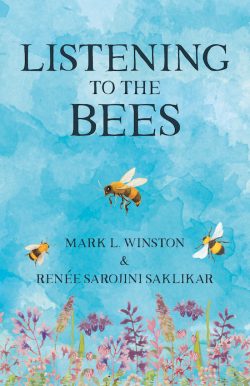 This is a book about bees, so the title does not disappoint. But it is also a personal memoir of a life in science by an eminent entomologist, as well a book of poetry by a celebrated bee-obsessed poet. In other ways too this is more than just one book.
This is a book about bees, so the title does not disappoint. But it is also a personal memoir of a life in science by an eminent entomologist, as well a book of poetry by a celebrated bee-obsessed poet. In other ways too this is more than just one book.
The scientist behind Listening to the Bees is Mark Winston, Simon Fraser University professor and one of the world’s leading bee experts. For this book, he has teamed up with award-winning poet Renée Sarolini Saklikar, Surrey’s first Poet Laureate, and creative writing teacher at SFU and Vancouver Community College. Together the duo have produced a singular collaboration that refuses to be a singular thing.
Saklikar has her own longstanding relationship with bees. About her infant head once danced bees, drawn by the honey with which her parents had anointed her in the course of an ancient Vedic ritual. For this collaboration, Saklikar crafts poetic responses to Winston’s many scientific publications and scientific memorabilia, pouring over old photographs, fingering old documents, resonating with their language without quite aiming to master or know the science or exact truths they contain. Instead, the poems are delicately arranged embedded fragments, “cribbed, found, merged, less description, more sound and always the dance most of all” (p. 19). The poems embrace and play with form, and some all but abandon grammar.
In some chapters, Winston (who in 2015 won the Governor General’s Literacy Award for Non-fiction) approaches Saklikar’s poetic concerns by foregrounding his own unscientific love of words, especially of certain evocative words from the world of beekeeping like queenright, teneral, hibernaculum, diapause, and pastoral. In the chapter, “The Poetry of Methodology,” Winston deftly weaves his shared passion for words into a recounting of the research of colleagues who went beyond his earlier pheromone findings to reveal the precise physical mechanisms by which the queen bee keeps her subjects eggless and without ovaries.
The book is neatly divided into brief chapters, with Saklikar’s poems interspersed throughout, like notes in the margins. Besides personal photographs, there are scientific drawings and other graphics, making it a very friendly and approachable book. Beyond recounting key scientific findings from his long career, Winston also reflects on the social and collaborative nature of the scientific endeavour, freely reporting the relevant contributions of other bee scientists, including those who have taken his own work further.
Winston also describes the approach he has evolved to leading scientific teams and inspiring new scientists. We see him paying back the lessons of trust and intellectual integrity he received from great early mentors, while crediting certain insights to “listening to the bees.” Later in the book, Winston devotes chapters to remembering deceased mentors. His memoir may be personal, but he is not the focus. There are lessons of leadership here, not just science and poetry.
Yet the bee science recounted in the book is worth the price of admission, ably supplemented by a very readable scientific appendix covering Winston’s main areas of research. But more philosophical themes are also woven through the book and emerge as the book goes on. Beyond the collaborative nature of science, Winston stresses the advantages of a decentralized organization of research. The lessons of the bees are also social and ecological. Listening is not mere scientific observation, but a wise heeding of the ecological norms the bees teach us.
The young would-be naturalist tracking beetles in the Yucatan soon gave way to the pragmatic experimentalist. Winston and his colleagues carefully cross-fostered bees of European stock with the invasive and sensationalized African killer bees. Young African bees nurtured in hives of European bees ended up behaving more like European bees, having longer lifespans caused by later onset of risky foraging behaviour.
The opposite was also the case, dooming official US attempts to impose a genetic barrier (a DNA wall?!) to stop their northward advance. The broader lesson here is that nature and nurture interact. Although in this case environment dominates genetics, the two factors are not to be understood as separate or opposed. This point bears repeating, since nature/nurture debates today often perpetuate a false dichotomy. Winston draws due conclusions about social policy for human tenerals.
Winston’s Swarm Team studied the remarkable phenomenon of swarming, when a thriving colony “hives-off” and forms a new colony. He nicely (though without scientific pretensions) analogizes the process to the movements of Beethoven’s Pastoral Symphony. The Swarm Team came to operate “as an extension of the hive.” Throughout the book Winston draws lessons from the harmonious functioning of the queenright hive, but also explores parallels to the human problem of the social integration of the individual and the coordination of human labour. One of the larger themes of Listening to the Bees is whether the integration of bee behaviour by the distribution of the queen’s all-important pheromone concoction can shed any light on “how selfless behaviour creates communal prosperity through the crucible of individual sacrifice” (p. 72).
 The pragmatic experimentalist eventually gave way to a seasoned ecologist. No research purist, Winston immersed himself in B.C. beekeeping culture, assumed leading positions in professional apiculture organizations, became a leading light in the local bee industry, and even invented FruitBoost, a spray of synthetic bee pheromone that increased bee visits and crop yields in local blueberry fields. The story of how his SFU lab isolated and synthesized the multifarious pheromone, “an elixir of elegant function,” makes a fascinating chapter of the book. More interesting still is how he came to regard his FruitBoost as a costly technological fix to an unnecessary ecological problem.
The pragmatic experimentalist eventually gave way to a seasoned ecologist. No research purist, Winston immersed himself in B.C. beekeeping culture, assumed leading positions in professional apiculture organizations, became a leading light in the local bee industry, and even invented FruitBoost, a spray of synthetic bee pheromone that increased bee visits and crop yields in local blueberry fields. The story of how his SFU lab isolated and synthesized the multifarious pheromone, “an elixir of elegant function,” makes a fascinating chapter of the book. More interesting still is how he came to regard his FruitBoost as a costly technological fix to an unnecessary ecological problem.
But deeper still are Winston’s later sober reflections that his early technological optimism was somewhat naive. Both authors aim in this book to voice the “beekeeper’s lament” (“All my companions have scattered”), to sound the alarm at the “global bee collapse” of the past few decades, and also to spread hope for the resilience of the bees. Early on Winston doubted that the low doses of neonicotinoids could be the cause of widespread colony death, and he came to embrace the precautionary principle and to appreciate, contrary to prevailing wisdom, that the dose is not the poison. The “safe levels” concept is itself unsafe.
Perhaps the whole book may best be seen as an application of Saklikar’s method of “juxtaposition of opposites.” The sharpest point of that opposition comes on pp. 147-8. Struggling to articulate some synthesis of science and poetry, to give free reign to his love of words while maintaining his intellectual integrity as a scientist, Winston settles on a common denominator. Comparing Saklikar’s “reductive” method of assembling found fragments to the scientific reduction contained in the behavioural consequences of chemical properties, Winston locates both in the Greek heúrēka, or eureka, I found it!
On the very next page, however, Saklikar elegantly demurs, hesitating before the finality of discovery despite her inspired use of the “cribbed, found, merged” elements. The logical contradiction is ultimately removed. Winston walks back his discoveries, his early technical solutions to complex ecological problems, advocating instead the wisdom of diversity, and the willing sacrifice of the individual to the collective good.
Winston’s most moving chapter is perhaps “Apples and Honey.” In putting his evidence-based spin on a Rosh Hashanah ritual, Winston comes close to Saklikar’s “quest [to] marry song, chants, spells and incantation with syntactical wordplay.” He feels most whole, Winston writes, in these moments of ceremonial blessing. The would-be natural philosopher finds a happy ending enjoying wordplay with a poet and valorizing in ritual the pastoral approach to beekeeping. Beyond science and poetry, there is ethical insight and spiritual wisdom to be found in Listening to Bees.
Winston made his way from the natural philosopher trekking in the Amazon to West Coast ecologist philosophizing warnings of over-simple technical solutions and preaching the gospel of diversity. To which I can only add, hallelujah.
*
Michael Picard is a philosopher, author, and public intellectual. He holds an MSc and a PhD in Philosophy from the Massachusetts Institute of Technology. Founder of Café Philosophy, a 12-year series of weekly philosophical dialogues for the general public, and currently facilitator with Simon Fraser University’s Philosophers’ Café program, he has animated over 600 sessions of public participatory philosophy. Picard is author of the widely translated This is not a Book: Adventures in Popular Philosophy (New Burlington Books 2008), still in print as Philosophy: Adventures in the Thought and Reasoning (Metro Books, 2012), co-author with Gary Hayden of Paradoxes: From Illusions to Infinity: Adventures in the Impossible (Metro Books, 2015), and Philosophy A to Z: Essays for Café Philosophy (Smashwords Editions, 2015). Picard teaches philosophy at Douglas College and cognitive science at SFU, having elsewhere taught graduate and undergraduate courses in psychology, management, leadership, economics, and sustainability. Former President of the Canadian Society for Philosophical Practice, and a Certified Counsellor of the American Philosophical Practice Association, he offers private philosophical therapeutics based on social (or use-based) theories of meaning.
*
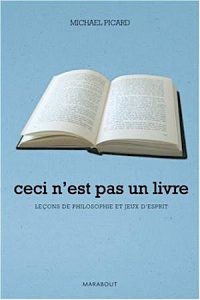 The Ormsby Review. More Books. More Reviews. More Often.
The Ormsby Review. More Books. More Reviews. More Often.
Editor/Designer/Writer: Richard Mackie
Publisher/Writer: Alan Twigg
The Ormsby Review is a journal service for serious coverage of B.C. books and authors, hosted by Simon Fraser University. The Advisory Board consists of Jean Barman, Robin Fisher, Cole Harris, Wade Davis, Hugh Johnston, Patricia Roy, David Stouck, and Graeme Wynn. Scholarly Patron: SFU Graduate Liberal Studies. Honorary Patron: Yosef Wosk. As of September, 2018, Provincial Government Patron: Creative BC
“Only connect.” – E.M. Forster



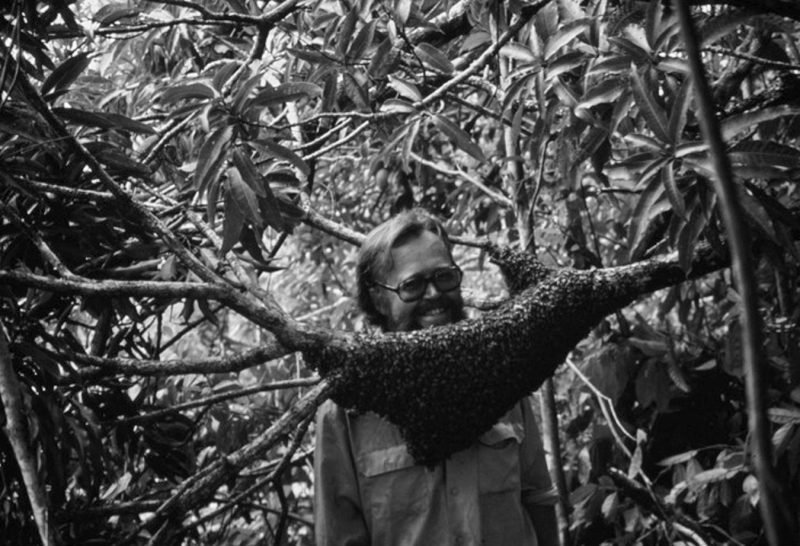
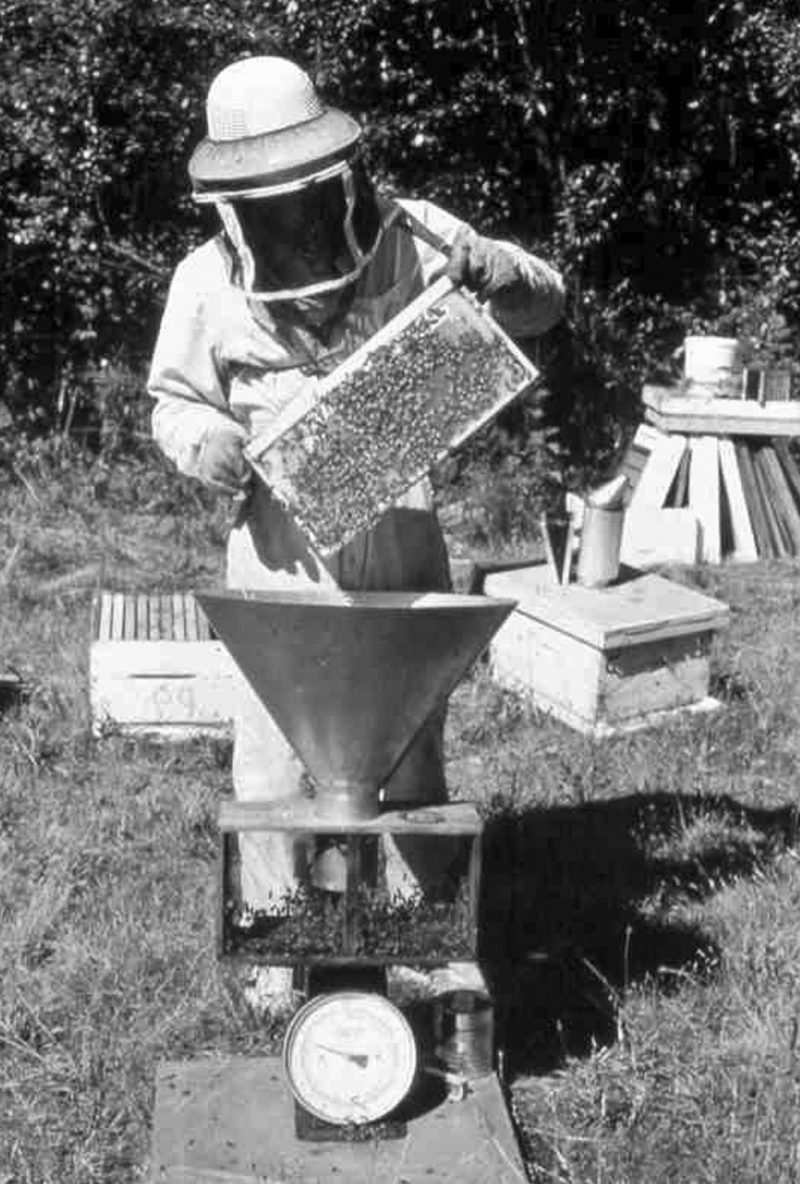
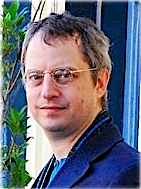

Leave a Reply